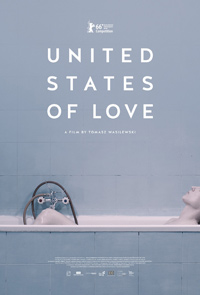Certain Women: Wasilewski Explores Enlightenment and Despair
 It was 1990, and the climate was changing. Or so begins Polish director Tomas Wasilewski’s third feature, United States of Love, which chooses to focus on four somewhat related women from the same apartment complex during significant political changes during the dissolution of the Soviet bloc. Accompanying their growing sense of freedom is a nagging element of dissatisfaction as they attempt to pursue fantasies and desires, often resulting in a disquieting mix of euphoria and despair. Arrestingly photographed in flat, sterile palettes with intermittent splotches of vibrant color, theirs is a universe just experiencing the tingle of life following deadening paralysis, with emotions like reawakened limbs still struggling to obtain an originally appointed purpose. Coldly observational, the film is sometimes curiously unsympathetic in its depiction of women experiencing glancing notions of freedom but hopelessly realized they’re still chained to incredibly limiting options. However, it sidesteps classification as dreary miserabilism, often capturing the inarticulate impression of the knowing dissatisfaction once referred to as the feminine mystique.
It was 1990, and the climate was changing. Or so begins Polish director Tomas Wasilewski’s third feature, United States of Love, which chooses to focus on four somewhat related women from the same apartment complex during significant political changes during the dissolution of the Soviet bloc. Accompanying their growing sense of freedom is a nagging element of dissatisfaction as they attempt to pursue fantasies and desires, often resulting in a disquieting mix of euphoria and despair. Arrestingly photographed in flat, sterile palettes with intermittent splotches of vibrant color, theirs is a universe just experiencing the tingle of life following deadening paralysis, with emotions like reawakened limbs still struggling to obtain an originally appointed purpose. Coldly observational, the film is sometimes curiously unsympathetic in its depiction of women experiencing glancing notions of freedom but hopelessly realized they’re still chained to incredibly limiting options. However, it sidesteps classification as dreary miserabilism, often capturing the inarticulate impression of the knowing dissatisfaction once referred to as the feminine mystique.
Marzena (Marta Nieradkiewicz) was once a beauty queen, now relegated to teaching yoga and dance as she pines for a husband who currently resides in West Germany. She also works at a video rental with Agata (Julia Kijowska), a woman unhappily married to Jacek (Lukasz Simla) but secretly obsessed with a handsome, local priest. Meanwhile, Marzena’s sister Iza (Magdalena Cielecka), a school principal, has been rebuffed by her lover, Karol (Andrzej Chyra), a married doctor who breaks off their affair following the death of his wife. And then there’s Renata (Dorota Kolak), a teacher soon to be laid off by Iza and increasingly obsessed with the vibrant beauty of her neighbor, Marzena.
Though it nabbed a Best Screenplay prize following its premiere at the Berlin International Film Festival, Wasilewski’s title draws uneasy comparison to Kelly Reichardt’s latest, Certain Women, which unspooled nary a month prior and engages in a similar structure of loosely related women daring to define their own elusive destinies. Wasilewski’s women are much more hopeless, painted in shades of dejection most compellingly determined in some segments more than others.
Wasilewski seems drawn to these tragic episodes of unrequited love, as the travails of Agata, Iza, and Renata are similar to the scenario outlined in his sophomore effort, Floating Skyscrapers, which depicts a woman who can’t let go of her boyfriend even after he confirms his homosexuality. The love that dare not speak its name would seem to apply to Renata’s unhealthy fixation with Marzena, who seems keen on replacing her dead ‘sister’ with a new companion. Renata’s loneliness is achingly presented, gushing over mawkish poetry to her class just prior to Iza coldly informs her of forced retirement, then later, in the film’s most garish bit, wiping semen off of Marzena’s abdomen as she’s passed out on her bed while a smiling poster of Whitney Houston hovers above them.
The desaturated palette almost seems black and white, with only some stray fruits on a dinner table indicated otherwise in the opening sequence. Famed DP Oleg Mutu (4 Months, 3 Weeks, 2 Days; Beyond the Hills) concocts another noteworthy mise en scene, carefully constructing frames somehow more chilly within the exteriors. These are drowned out landscapes, a smoky sheen accompanying washed out blonde women, which makes little moments seem all the more startling, such as Agata’s colorful sweater which she dons as plumage to attract the attentions of the priest. Tears of quiet despair will mark the finale for more than one of these characters, and bodies of water is a recurring motif, such as a comforting bath or the devastation atop the surface of a frozen lake.
Many of Wasilewski’s cast are notable Polish actors, including Magdalena Cielecka and Andrzej Chyra of Wajda’s Katyn (Chyra was also recently starred in Malgorzata Szumowska’s excellent In the Name Of…) while Julia Kijowska appeared in Agnieszka Holland’s Oscar nominated In Darkness (2011). Dorota Kolak, a notable television star, manages to be the most sympathetic, a woman both manipulative and pathetic but also genuinely moving in her attempts to reach out to Marzena. Both Cielecka and Kijowska seem flinty and brittle, each on opposing ends of the obsession spectrum, filled with inconsolable anguish.
Detailing the lives of desperately unhappy women, The United States of Love may sound like a slog, but its greatest crime would seem its inability to give each compelling character their equal dues. Otherwise, the title marks Wasileswki as an incredibly promising new Polish auteur.
Reviewed on February 19 at the 2016 Berlin International Film Festival – Competition. 104 Mins.
★★★½/☆☆☆☆☆


